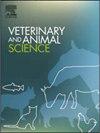牛、绵羊和山羊对 SARS-CoV-2 的体液免疫反应
IF 1.9
Q2 AGRICULTURE, DAIRY & ANIMAL SCIENCE
引用次数: 0
摘要
继 2019 年末出现 SARS-CoV-2 之后,通过实验接种和动物监测活动,发现多个种类的家养和野生动物容易感染 SARS-CoV-2。检测动物体内的 SARS-CoV-2 特异性抗体是一项重要的监测工具,因为动物体内的病毒脱落只能在短时间内检测到。本研究在 2019 年至 2022 年期间从美国多个地区收集了 691 头牛、698 只绵羊和 707 只山羊的血清样本。使用两种商用酶联免疫吸附试验(ELISA)对样本中是否存在 SARS-CoV-2 特异性抗体进行了评估;一种是基于 SARS-CoV-2 受体结合域(sVNT)的抑制试验,另一种是基于 SARS-CoV-2 核壳蛋白(N-ELISA)的抑制试验。此外,还利用武汉样 SARS-CoV-2 USA/WA1/2020 分离物进行了常规病毒中和试验(VNT),对 sVNT 阳性样本进行了评估。我们的结果表明,使用 sVNT 时,1%(6/691)的牛、2%(13/698)的绵羊和 2.5%(18/707)的山羊血清样本呈阳性,而使用 N-ELISA 时,4%(25/691)的牛、27/698 的绵羊和 2.5%(18/707)的山羊血清样本呈阳性。没有一个 sVNT 阳性的牛、绵羊或山羊血清样本能通过 VNT 检测到针对 SARS-CoV-2 USA/WA1/2020 分离物的中和抗体活性 (<1:8)。我们的研究结果表明,美国牛、绵羊和山羊的血清阳性率较低,这表明继续监测与人类密切接触的动物物种中 SARS-CoV-2 流行情况的重要性。本文章由计算机程序翻译,如有差异,请以英文原文为准。
Cattle, sheep, and goat humoral immune responses against SARS-CoV-2
Following the emergence of SARS-CoV-2 in late 2019, several species of domestic and wild animals have been found to be susceptible to SARS-CoV-2 infection through experimental inoculation and animal surveillance activities. Detection of SARS-CoV-2 specific antibodies in animals is an important surveillance tool since viral shedding in animals can only be detected for a short period of time. In this study, convenience serum samples were collected from 691 cattle, 698 sheep, and 707 goats from several regions in the United States, between 2019 and 2022. The samples were evaluated for the presence of SARS-CoV-2 specific antibodies using two commercial enzyme-linked immunosorbent assays (ELISA); one based on the inhibition of the SARS-CoV-2 receptor-binding domain (sVNT) and the other based on the nucleocapsid protein (N-ELISA) of SARS-CoV-2. Positive samples from the sVNT were additionally evaluated using a conventional virus neutralization test (VNT) employing the Wuhan-like SARS-CoV-2 USA/WA1/2020 isolate. Our results indicate that ∼1 % (6/691) of cattle, ∼2 % (13/698) of sheep, and ∼2.5 % (18/707) of goat serum samples were positive when using the sVNT, whereas ∼4 % of cattle (25/691) and sheep (27/698), and 2.5 % (18/707) of goat serum samples tested positive with the N-ELISA. None of the sVNT positive cattle, sheep, or goat serum samples had detectable neutralizing antibody activity (<1:8) against the SARS-CoV-2 USA/WA1/2020 isolate by the VNT. Our results indicate low seropositivity in cattle, sheep, and goats in the U.S., indicating the importance to continue monitoring for SARS-CoV-2 prevalence in animal species that are in close contact with humans.
求助全文
通过发布文献求助,成功后即可免费获取论文全文。
去求助
来源期刊

Veterinary and Animal Science
Veterinary-Veterinary (all)
CiteScore
3.50
自引率
0.00%
发文量
43
审稿时长
47 days
 求助内容:
求助内容: 应助结果提醒方式:
应助结果提醒方式:


